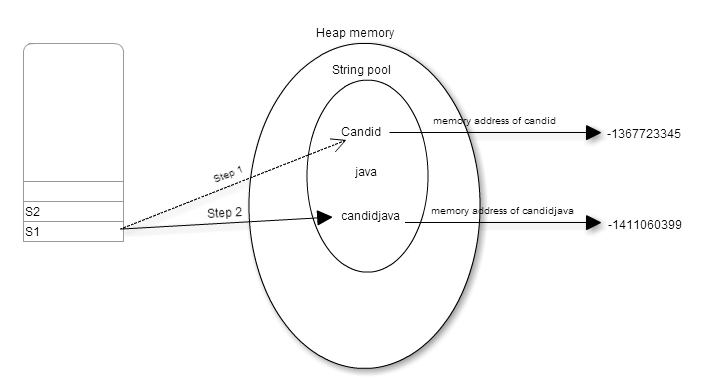Why Are Strings Immutable in Java? Trick Factors and Advantages Explained
Why Are Strings Immutable in Java? Trick Factors and Advantages Explained
Blog Article
Discovering the Advantages of Unalterable Strings in Modern Programming Paradigms
In the realm of modern programs paradigms, the principle of unalterable strings stands as a cornerstone of robust software growth. By taking on unalterable strings, developers can make certain enhanced data honesty, improved string safety and security, streamlined debugging procedures, boosted safety and security measures, and reliable efficiency optimization.
Boosted Data Stability

By protecting against the modification of string items, immutability removes the danger of unintentional changes to the information they hold. This not just enhances the protection of the info but also boosts the integrity of the code that relies upon these strings.
Immutability additionally supports more secure multithreading atmospheres, as simultaneous access to unalterable strings does not position the risk of information corruption through simultaneous modifications. This home simplifies the procedure of taking care of strings in parallel programs circumstances.
Basically, immutability serves as a safety shield around the information kept within strings, enhancing their honesty by making sure that once specified, their worths stay unmodified throughout the program's implementation.

Boosted Thread Security
Immutable strings improve the string security of programs by ensuring that as soon as a string things is produced, its value can not be modified. This home removes the danger of simultaneous threads attempting to change the very same string concurrently, which can bring about information corruption or inconsistent states in the program - Why are strings immutable in Java?. In a multi-threaded environment, where numerous threads access and adjust data simultaneously, the immutability of strings provides a degree of security by ensuring that the data stays the same throughout its lifecycle
Simplified Debugging Processes
Given the enhanced string safety and security promoted by immutable strings, a substantial benefit occurs in the realm of simplified debugging processes. Unalterable strings, as soon as produced, can not be altered, making it easier to trace the circulation of information and determine the resource of pests in a program. This immutability makes certain that strings continue to be consistent throughout the execution of the program, decreasing the possibility of unexpected adjustments that might cause mistakes.
When debugging with mutable strings, designers frequently experience issues where a string's worth is changed accidentally, making it challenging to determine the origin of a pest. Nonetheless, with unalterable strings, the data remains unmodified, allowing developers to concentrate on evaluating the real reasoning of the code as opposed to finding where and when a string was customized incorrectly.
Furthermore, unalterable strings simplify the debugging process by enabling simpler recreation of insects. Since immutable strings do not alter state, developers can recreate and study insects extra properly, bring about quicker identification and resolution of issues within the codebase. This streamlined debugging process inevitably check out here contributes to higher software top quality and improved total advancement performance.

Raised Protection Steps
Enhancing information defense and strengthening system integrity, the utilization of immutable strings in software applications adds substantially to increased safety measures. Immutable strings, as soon as developed, can not be changed, supplying a crucial protection versus malicious meddling or unapproved accessibility. By ensuring why not try this out that sensitive data stored in strings remains unchanged throughout the program's execution, the threat of data breaches or shot strikes is significantly minimized. Why are strings immutable in Java?. Immutable strings additionally play a vital duty in stopping usual protection susceptabilities such as buffer overflows and SQL shot assaults, as efforts to control string information at runtime are inherently limited.
In addition, the immutability of strings enhances the predictability of program habits, making it easier to verify inputs and avoid unforeseen adjustments that could compromise security. This predictability simplifies the process of bookkeeping and validating code, allowing developers to recognize possible safety and security technicalities extra properly. Overall, incorporating immutable strings right into software program development methods not just improves the robustness and integrity of applications however likewise strengthens their resilience against protection threats.
Efficient Efficiency Optimization
When dealing with mutable strings, operations like concatenation or substring development usually result in the development of new string things, leading to memory expenses and increased processing time. By allowing strings to remain unchangeable home and continuous, unalterable strings help with much better memory administration and caching chances, ultimately enhancing the overall performance of the software.
Because unalterable strings can not be changed as soon as developed, they can be shared throughout threads without the threat of unexpected adjustments, minimizing the demand for synchronization mechanisms and enhancing concurrency. Unalterable strings simplify debugging processes as programmers can trust that a string's value will certainly stay constant throughout the program's execution, eliminating possible mistakes caused by mutable state adjustments.
Verdict
To conclude, the benefits of utilizing immutable strings in modern programming standards can not be overstated. Boosted data honesty, enhanced thread security, simplified debugging processes, raised safety actions, and reliable efficiency optimization all contribute to the overall performance of programs tasks. By incorporating unalterable strings into programs practices, developers can take advantage of a more robust and reliable codebase.
Immutability, a vital function of strings in programming languages such as Java and Python, guarantees that when a string things is created, it can not be modified or modified.Immutable strings improve the string safety and security of programs by guaranteeing that as soon as a string item is produced, its value can not be changed. Unalterable strings also play a vital function in avoiding typical safety susceptabilities such as barrier overflows and SQL injection assaults, as efforts to adjust string data at runtime are inherently restricted.
By allowing strings to stay stable and continuous, unalterable strings help with far better memory monitoring and caching possibilities, inevitably increasing the total effectiveness of the software.
Unalterable strings simplify debugging procedures as designers can trust that a string's worth will certainly remain constant throughout the program's execution, removing potential errors triggered by mutable state adjustments.
Report this page